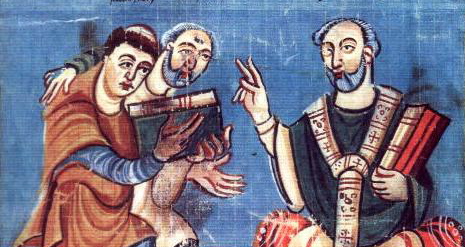Alcuin of York was born around 735 and died on this day, May 19, in the year 804. He got to write his own obituary, or rather epitaph, which goes like this:
Hic, rogo, pauxillum veniens subsiste viator…
Oops, I mean like this:
Here, I beg thee, pause for a while, traveler,
And ponder my words in thy heart,
That thou mayest understand thy fate in my shadow:
The form of thy body will be changed as was mine.
What thou art now, famous in the world, I have been, traveler,
And what I now am, thou wilt be in the future.
I was wont to seek the joys of the world in vain desire:
Now I am ashes and dust, and food for worms.
Remember therefore to take better care of thy soul
Than of thy body, because that survives, and this perishes.
Why dost thou look for possessions? Thou see’st in what a little cavern
This tomb holds me: Thine will be equally small.
Why art thou eager to deck in Tyrian purple thy body
Which soon in the dust the hungry worm will devour?
As flowers perish when comes the menacing wind,
So also thy flesh and all thy glory perish.
Give me, I beg thee, O reader, a return for this poem,
And pray: “Grant, O Christ, forgiveness to thy servant.”
I implore thee, let no hand profane the holy rights of this tomb,
Until the angelic trumpet announces from Heaven high:
“Thou who liest in the tomb, rise from the dust of the earth,
The Mighty Judge appears to countless thousands.”
My name was Alcuin, and wisdom was always dear to me.
Pour out prayers for me when thou quietly readest this inscription.
Alcuin did show himself to be one to whom “wisdom was always dear.” He was in the early wave of scholars who were gathered to the court of Charlemagne to undertake a program of educational reform and improvement. Alcuin was primarily a theologian, and wrote volminous Bible commentaries, and works in defense of the Trinity and against a new Spanish version of the adoptionist heresy. But as an educator and a man to who “wisdom was always dear,” he also branched out to instruction in the liberal arts. He invented that thought problem you’ve heard about the fox and the goose and the bag of corn that need to be taken across a river but can’t be trusted alone on one side of the river together.
